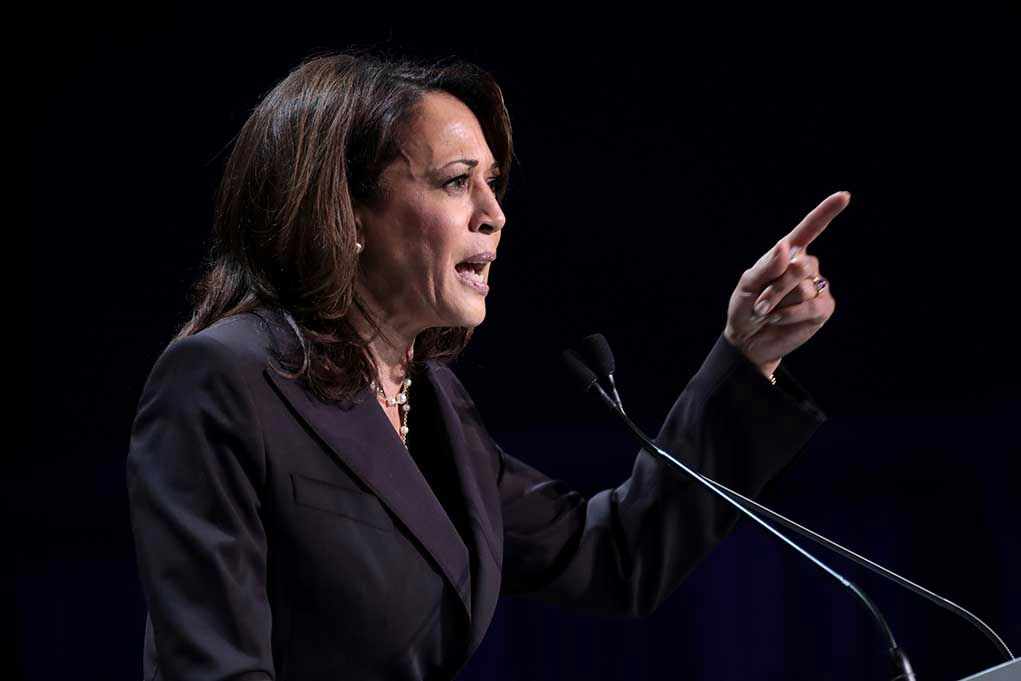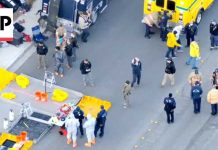
President Trump’s swift revocation of Kamala Harris’ Secret Service protection—months before its scheduled end—has sparked fierce debate over executive power, political precedent, and the burden now placed on local law enforcement.
Story Highlights
- Trump rescinded Harris’ extended Secret Service detail effective September 1, 2025, breaking with established precedent.
- Local and state agencies, including the LAPD and California Highway Patrol, took over Harris’ security after federal withdrawal.
- No public explanation was provided for the sudden revocation, fueling accusations of political retaliation from California officials.
- The move has ignited debate over federal authority, the politicization of protective services, and resource strains on local law enforcement.
Unprecedented Revocation of Extended Secret Service Protection
In a highly unusual move, President Trump revoked the extended Secret Service protection for former Vice President Kamala Harris effective September 1, 2025. This action came months before the scheduled expiration of her protection, which had been extended by former President Biden due to what he cited as ongoing security concerns following Harris’ high-profile post-vice-presidential activities. By law, former vice presidents typically receive Secret Service coverage for six months after leaving office; extensions are rare and only granted under exceptional circumstances. The Trump administration offered no public rationale for this sudden reversal, breaking with the established norm of continuity in post-office security for top officials.
Without federal protection, responsibility immediately shifted to state and local agencies, notably the LAPD Metropolitan Division and California Highway Patrol. California Governor Gavin Newsom was required to formally approve the allocation of state resources, and local law enforcement had to adjust their operations to fill the unexpected security gap. This transition occurred as Harris prepared for a public book tour and continued to participate in high-visibility events, heightening both the logistical demands and the potential risks. The abrupt handover placed significant strain on local agencies, requiring elite officers to be reassigned from core crime suppression duties, which quickly drew scrutiny and pushback from within police ranks.
Political Backlash and Accusations of Retaliation
The revocation of Harris’ protection triggered immediate and vocal criticism from California officials. Los Angeles Mayor Karen Bass publicly labeled the decision “another act of revenge” and warned it set a dangerous precedent by making personal security subject to “erratic, vindictive political impulses.” Governor Newsom’s office similarly condemned the move, emphasizing that safeguarding public officials should not be politicized. Harris’ spokesperson noted that no reason was provided for the withdrawal, fueling suspicions of political motivation, especially given the contentious relationship between Harris and the Trump administration. This episode has further inflamed existing political polarization, particularly in Los Angeles, which has recently experienced heightened unrest and federal intervention related to immigration enforcement.
The role reversal—federal withdrawal and state assumption of security—raised questions about the independence and continuity of protective services for former high-ranking officials. Some critics argue that the move could have a chilling effect on future officials, deterring them from public engagement after leaving office due to uncertainty over their safety. Others warn of the increased burden on local resources, which were already stretched thin, and the loss of specialized federal expertise in handling high-profile threats. The lack of transparency from the Trump administration has left the public and political observers to draw their own conclusions about the motivations and implications of the decision.
Implications for Protective Services and Executive Authority
Experts in national security and public administration note that the president holds broad discretion over Secret Service assignments, but stress that such decisions have rarely been used in a way that appears so politically charged. Legal scholars caution that while the executive branch has the authority to end protection details, doing so in a manner that appears retaliatory or targeted could undermine the nonpartisan foundation of protective services. Security professionals warn that the abrupt transition creates immediate risk, particularly during public events, and may encourage future politicization of what has traditionally been a neutral responsibility of the federal government.
LAPD ends Kamala Harris security after union backlash over elite officer use: report https://t.co/NFT7qz9AOd
— Fox News Politics (@foxnewspolitics) September 8, 2025
The longer-term impact of this episode remains to be seen. The precedent set by revoking extended protection before its expiration could prompt legislative review of Secret Service policies, as lawmakers weigh the balance between executive authority and the need for impartial, continuous security for former officials. Meanwhile, the increased costs and logistical burdens on local and state agencies highlight the practical consequences of shifting security responsibilities. As the nation continues to grapple with deep political divides, the treatment of Harris’ security detail serves as a flashpoint in the broader debate over the boundaries of presidential power and the safeguarding of American institutions.
Sources:
Elite California unit steps up after Kamala Harris’ Secret Service detail times out
Trump revoked Harris’ Secret Service protection. Now, California police are guarding her




